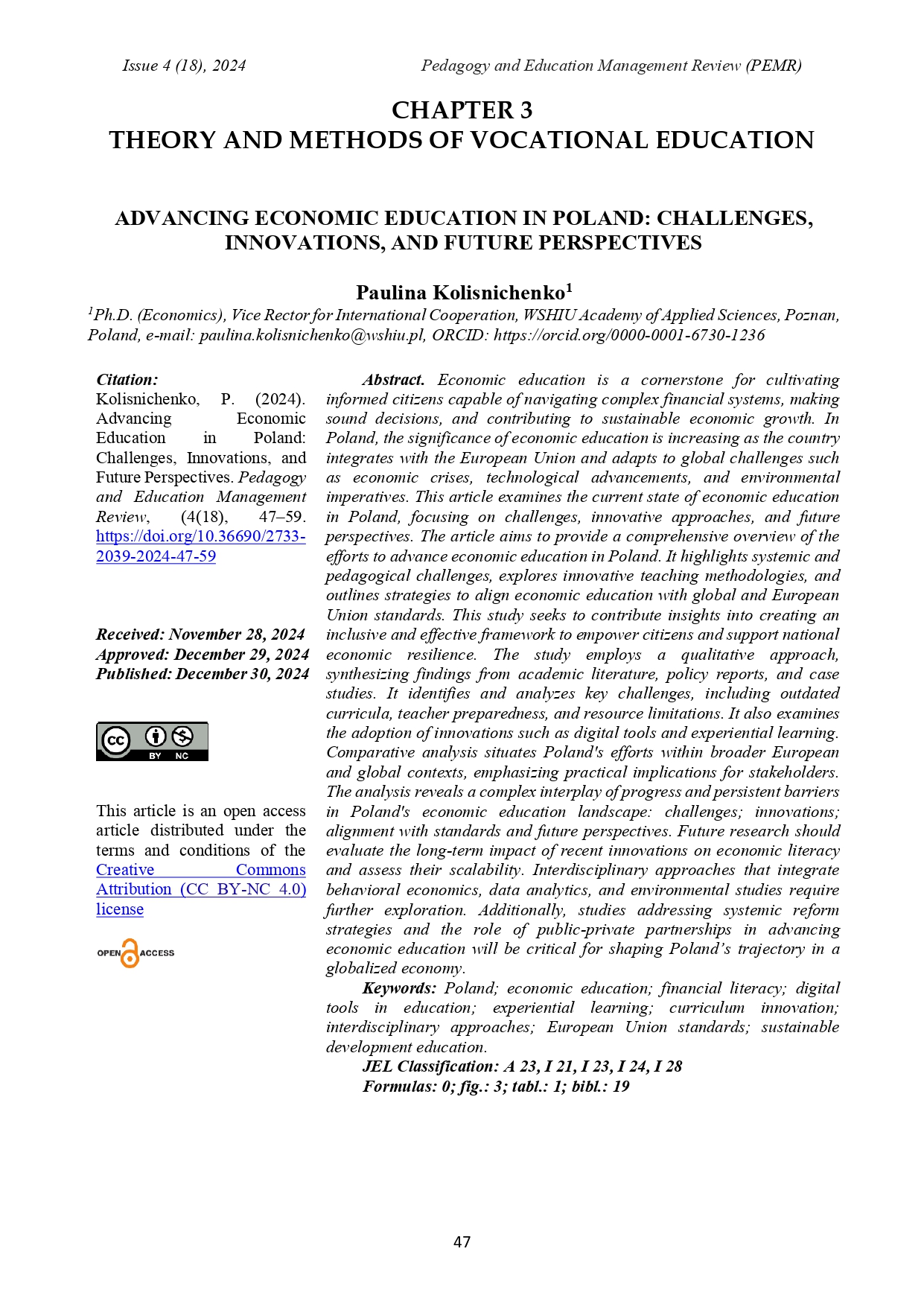ADVANCING ECONOMIC EDUCATION IN POLAND: CHALLENGES, INNOVATIONS, AND FUTURE PERSPECTIVES
DOI:
https://doi.org/10.36690/2733-2039-2024-47-59Keywords:
Poland, economic education, financial literacy, digital tools in education, experiential learning, curriculum innovation, interdisciplinary approaches, European Union standards, sustainable development educationAbstract
Economic education is a cornerstone for cultivating informed citizens capable of navigating complex financial systems, making sound decisions, and contributing to sustainable economic growth. In Poland, the significance of economic education is increasing as the country integrates with the European Union and adapts to global challenges such as economic crises, technological advancements, and environmental imperatives. This article examines the current state of economic education in Poland, focusing on challenges, innovative approaches, and future perspectives. The article aims to provide a comprehensive overview of the efforts to advance economic education in Poland. It highlights systemic and pedagogical challenges, explores innovative teaching methodologies, and outlines strategies to align economic education with global and European Union standards. This study seeks to contribute insights into creating an inclusive and effective framework to empower citizens and support national economic resilience. The study employs a qualitative approach, synthesizing findings from academic literature, policy reports, and case studies. It identifies and analyzes key challenges, including outdated curricula, teacher preparedness, and resource limitations. It also examines the adoption of innovations such as digital tools and experiential learning. Comparative analysis situates Poland's efforts within broader European and global contexts, emphasizing practical implications for stakeholders. The analysis reveals a complex interplay of progress and persistent barriers in Poland's economic education landscape: challenges; innovations; alignment with standards and future perspectives. Future research should evaluate the long-term impact of recent innovations on economic literacy and assess their scalability. Interdisciplinary approaches that integrate behavioral economics, data analytics, and environmental studies require further exploration. Additionally, studies addressing systemic reform strategies and the role of public-private partnerships in advancing economic education will be critical for shaping Poland’s trajectory in a globalized economy.
Downloads
References
Berti, C., & Cipollone, P. (2017). Economic education as a driver of civic engagement and financial responsibility. Journal of Economic Education Research, 12(3), 45-62.
Borowiecki, T. (2022). Aligning economic education with labor market demands: A perspective for Poland's knowledge economy. Education and Economy, 15(2), 125-142.
Czerniawski, K., & Wojtasik, M. (2023). Inclusive economic education: Addressing the needs of diverse populations. Polish Journal of Education Policy, 18(1), 56-74.
European Commission. (2021). Economic education in the European Union: Challenges and opportunities. Brussels: European Union Publications Office.
Gajewska, A., & Wójcik, B. (2019). Disparities in economic education across urban and rural Poland. Educational Inequalities Review, 10(4), 89-105.
Hess, D., & Ludlow, M. (2020). Integrating real-world economic problems into classroom instruction. Global Education Perspectives, 8(1), 33-48.
Jakubik, A., & Zajac, P. (2019). Simulation-based learning in economic education: Enhancing engagement and retention. Innovations in Education, 7(2), 58-76.
Kowalski, P. (2020). Structural challenges in Polish economic education: Outdated curricula and teacher preparedness. Contemporary Education Studies, 5(3), 67-82.
Kwiatkowski, T. (2015). The role of economic education in Poland's transition to a market economy. Economic Transition Journal, 20(2), 98-116.
Łagowska, M. (2020). Aligning Poland’s economic education with European Union standards. Journal of Comparative Education, 13(4), 123-138.
Mihus, I. (2023). OVERVIEW OF THE METHODOLOGY OF UNIVERSITIES` INTERNATIONAL RANKINGS FOR MEETING THE CHALLENGES OF OPEN SCIENCE. Pedagogy and Education Management Review, (1), 13–21. https://doi.org/10.36690/2733-2039-2023-1-13.
Nowak, Z., & Szewczyk, A. (2017). Systemic underinvestment in economic education infrastructure in Poland. Polish Educational Review, 9(1), 45-59.
Nowakowska, J., et al. (2021). E-learning platforms as tools for economic education in Poland. Technology in Education Quarterly, 11(3), 77-89.
Piekarska, K. (2021). Partnerships in economic education: Schools and businesses collaborating for better outcomes. Business-Education Synergy, 14(3), 102-117.
Rybicka, M. (2018). The evolution of economic education in Poland: Historical perspectives. Educational Studies Review, 6(2), 34-49.
Sobczak, A. (2018). Experiential learning in economic education: Bridging theory and practice. Journal of Economic Pedagogy, 10(1), 22-39.
Spivak, I., Mihus, I., & Greben, S. (2024). FINANCIAL LITERACY AND GOVERNMENT POLICIES: AN INTERNATIONAL STUDY. Public Administration and Law Review, (2(18), 21–33. https://doi.org/10.36690/2674-5216-2024-2-21-33.
Spivak, I., Mihus, I., & Greben, S. (2024). A COMPARATIVE ANALYSIS OF THE DIGITAL COMPETENCIES DEVELOPMENT IN ADULT EDUCATION. Pedagogy and Education Management Review, (2(16), 18–27. https://doi.org/10.36690/2733-2039-2024-2-18-27.
Ziółkowska, M. (2022). Interdisciplinary approaches in economic education: Behavioral economics, data analytics, and environmental studies. Contemporary Educational Innovations, 15(1), 87-105.







